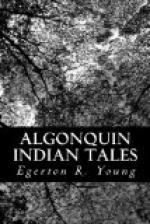“Some queer things were said sometimes. At one council the bear found great fault with the fox, who had deceived him, and had caused him to lose his beautiful tail by telling him to go and catch fish in a big crack in the ice. He sat there so long that the crack froze up solidly and to save his life he had to break off his tail.
“But all the things they talked about were not so funny as that. They had their troubles and dangers, and they discussed various plans for improving their condition and considered how they could best defeat the skill and cleverness of the human hunters.
“When the rabbit’s turn came to be heard he had indeed a sorrowful tale to tell. He said that his people were nearly all destroyed. The rest of the world seemed combined against his race, and they were killing them by day and night, in summer and winter, and they had but little power to fight against their many enemies. They were almost discouraged, but had come to the council to see if their brethren could suggest any remedy or plan to save them from complete destruction. While the rabbit was speaking the wolverine winked at the wildcat, while the fox, although he tried to look solemn, could not keep his mouth from watering at the thought of the many rabbits he intended yet to eat.
“Thus it can be seen that the poor, harmless rabbit did not get much sympathy from that part of the crowd that killed his race all the rest of the year.
“Still there were some animals, like the moose, and the reindeer, and the mountain goat, that stood up in the council and spoke out bravely for the rabbit. Indeed they told the animals that had only laughed at the rabbit’s sad story that, if nothing was done for the little rabbit and they went on killing as they were doing, they would soon be the greatest sufferers, for if the rabbits were all gone there was nothing else that they could get in sufficient numbers to keep them alive. This, which is a fact, rather sobered some of them at first; but they soon resumed their mocking at the poor little rabbit and his story, and, as they were in the majority, the council refused to do anything in the matter.
“When the moose heard the decision of the council he was very sorry for his poor little brother the rabbit, so after thinking it over he told the rabbit to jump up on one of his flat horns while he was holding them down. Then the moose carried him out some distance from the council meeting, and said:
“There is no hope for you here. The most of the animals live on you, and so they will not do anything that will make it more difficult for you to be caught than it is now. Your only chance is to go to Nanahboozhoo, and see what he can do for you.”
“Hurrah!” shouted Sagastao. “I thought it would be to Nanahboozhoo after all.”
Continuing, Souwanas said:
“The moose encouraged the rabbit by saying, ’Nanahboozhoo’s name was once Manabush, or Keche-Wapoose, Great Rabbit, and so I am sure he will be your friend, as I think he is a distant relation.’




